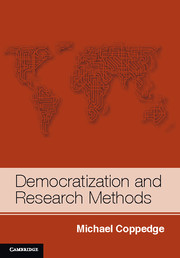Book contents
- Frontmatter
- Contents
- List of tables
- List of figures
- Acknowledgments
- 1 Research methods and democratization
- 2 Defining and measuring democracy
- 3 Criteria for evaluating causal theories
- 4 Checklists, frameworks, and Boolean analysis
- 5 Case studies and comparative history
- 6 Formal models and theories
- 7 Rigor in extensive and intensive testing
- 8 Political culture and survey research
- 9 Quantitative testing
- 10 An agenda for future research
- References
- Index
3 - Criteria for evaluating causal theories
Published online by Cambridge University Press: 05 July 2012
- Frontmatter
- Contents
- List of tables
- List of figures
- Acknowledgments
- 1 Research methods and democratization
- 2 Defining and measuring democracy
- 3 Criteria for evaluating causal theories
- 4 Checklists, frameworks, and Boolean analysis
- 5 Case studies and comparative history
- 6 Formal models and theories
- 7 Rigor in extensive and intensive testing
- 8 Political culture and survey research
- 9 Quantitative testing
- 10 An agenda for future research
- References
- Index
Summary
Much of our knowledge about politics is factual or descriptive. It requires useful concepts and valid, reliable measurement, as discussed in Chapter 2. Often, it goes beyond describing static, unchanging situations and constructs narrative accounts of specific events. These accounts can be richly detailed, amounting to histories of events and processes that enable us to feel that we understand what happened and why. Much of our understanding of the birth and death of democracies consists of this kind of knowledge. If one wants to understand how democracy evolved in Great Britain, there are hundreds of books that recount the process in exhaustive detail. Most other countries are not quite as well studied, but there are still dozens of books on democratization in Brazil and Japan and even a healthy number of books or articles on relatively neglected cases such as Paraguay, Botswana, Sri Lanka, and Mongolia. The knowledge contained in these works is essential and extremely valuable; it is a scholarly achievement that deserves greater appreciation.
This literature is so massive that it would be foolish to attempt to summarize it in this book. Instead, I focus here on attempts to develop a theoretical understanding of democratization, which is a quite different kind of knowledge. I do not argue with readers who prefer an idiographic, every-case-is-unique understanding to any attempt to develop a nomothetic, or theoretical, understanding. However, those who seek a theoretical understanding must develop and test theory.
- Type
- Chapter
- Information
- Democratization and Research Methods , pp. 49 - 75Publisher: Cambridge University PressPrint publication year: 2012

